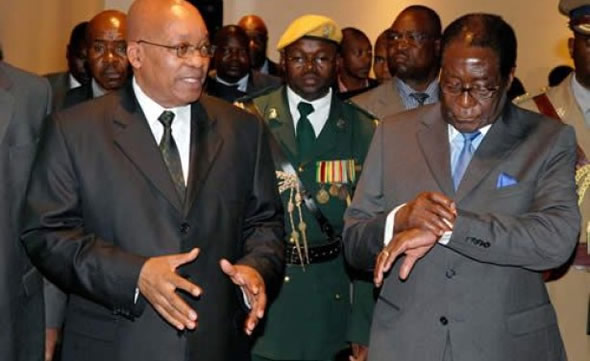
PRESIDENT Robert Mugabe yesterday extended an olive branch to his Western critics as he dished out numerous promises to Zimbabweans under his new government.
EVERSON MUSHAVA CHIEF REPORTER
Mugabe, speaking at the official opening of the Eighth Parliament in Harare boycotted by the MDC-T, said the new Parliament would amend laws to align them to the new Consitution.
He said laws would be passed to stem the scourge of corruption and his government would pursue pro-poor policies.
Mugabe also signalled his readiness to mend fences with foes including the West.
“We stand ready to work with even those who before were at odds with us,” he said.
“On the other hand we will continue to demand the immediate and unconditional removal of sanctions imposed by some arrogant Western countries.
“Regionally, we will continue to play an effective role in the African Union, Comesa and Sadc where we have recently been elected as the deputy chair.”
- Chamisa under fire over US$120K donation
- Mavhunga puts DeMbare into Chibuku quarterfinals
- Pension funds bet on Cabora Bassa oilfields
- Councils defy govt fire tender directive
Keep Reading
The 89-year-old leader has expressed frustration at the reluctance by the United States, Australia and the European Union to endorse his re-election saying it’s a sign they were still pursuing a regime change agenda in Zimbabwe.
African countries endorsed the outcome of the July 31 elections although their observer missions noted some irregularities during the controversial vote.
Mugabe also said his government would push for the implementation of the indigenisation programme with “renewed vigour”.
The aim, he said, was to allow locals to become “significant stakeholders in the running of the national economy,” and not to be “bystanders”.
He said the indigenisation laws would be reviewed and strengthened, while an evaluation mechanism would be put in place to ensure proper management of the community development share ownership schemes around the country.
“To this end, the National Indigenisation and Economic Empowerment Fund will be capitalised so as to give impetus to the implementation process,” he said.
Investors have shunned Zimbabwe, denying the country the much-needed foreign direct investment, citing the country’s controversial indigenisation laws.
Mugabe, whose previous administrations have been weighed down by allegations of corruption, said he would not tolerate graft this time round.
He said the establishment of an independent body, the National Prosecuting Authority under the new Constitution would bolster the fight against corruption.
“My government will exercise zero tolerance to the scourge of corruption,” Mugabe said.
“The composition of the Anti-Corruption Commission will also be aligned to the new Constitution, while anti-corruption commissioners will be required to adhere to a strict code of ethics and to also publicly declare their assets.”
Mugabe said a Constituency Development Fund Bill would be tabled before Parliament to improve accountability in the way the fund would be managed.
This follows allegations of abuse of the fund by previous legislators.
“Members of this Parliament should take note that the law will descend heavily on all those who will abuse the fund,” Mugabe charged.
Parastatals which have the potential to contribute 40% of the gross domestic product, would be revamped into competitive entities, he said.
Heads of parastatals would sign performance-based contracts as the government adopts a results-based management approach to force accountability and efficient service delivery.
Mugabe reiterated his earlier promise to review salaries and conditions of service for civil servants.










